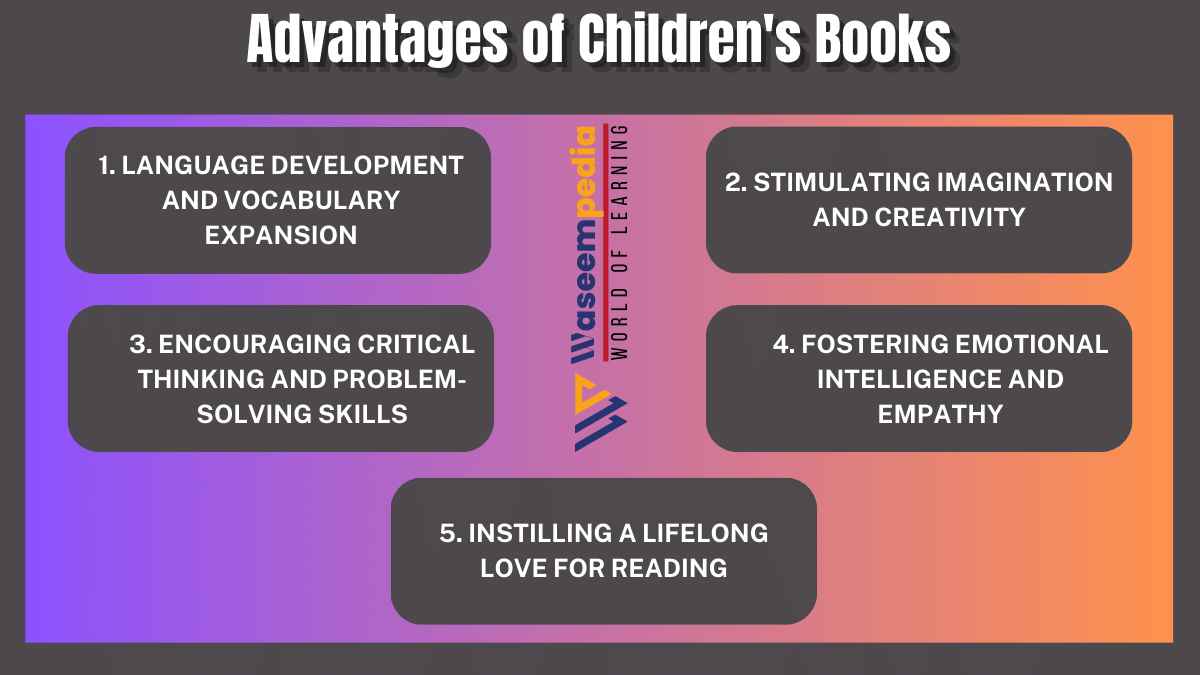Children’s books hold immense advantages in nurturing creativity, language development, critical thinking, and instilling a lifelong love for reading. Through the pages of these books, children embark on imaginative adventures, expand their vocabulary, and develop important cognitive and emotional skills.
So, let us embrace the power of children’s books, as they open the doors of imagination and ignite the flame of lifelong learning in young hearts and minds.
Children’s books hold a special place in the literary world, captivating young minds and fostering a love for reading from an early age. These books offer a world of imagination, adventure, and life lessons, stimulating young readers’ creativity and nurturing their thirst for knowledge.
In this article, we will explore the advantages of children’s books, highlighting how they promote language development, encourage critical thinking, and instill a lifelong love for reading.
5 Advantages of Children’s Books
5 Advantages of Children’s Books are as following.
1. Language Development and Vocabulary Expansion
One of the primary advantages of children’s books is their role in language development and vocabulary expansion. Through engaging narratives, colorful illustrations, and age-appropriate language, these books introduce children to new words, concepts, and storytelling techniques.
Reading aloud to children exposes them to the rhythm and cadence of language, helping them develop listening skills and phonological awareness. The rich vocabulary found in children’s books contributes to the expansion of their vocabulary, enabling them to express themselves more effectively and comprehend more complex texts as they grow older.
2. Stimulating Imagination and Creativity
Children’s books are a gateway to the world of imagination and creativity. They transport young readers to magical realms, introduce them to extraordinary characters, and inspire imaginative play.
The vivid illustrations and compelling narratives found in children’s books encourage children to visualize and create their own stories, fostering their creative thinking and imaginative abilities. Through the pages of these books, children learn to think outside the box, explore new ideas, and embrace their unique perspectives.
3. Encouraging Critical Thinking and Problem-Solving Skills
Children’s books often contain valuable life lessons, moral dilemmas, and problem-solving scenarios that encourage critical thinking and the development of problem-solving skills.
As children navigate the challenges faced by the characters, they are prompted to consider different perspectives, analyze cause-and-effect relationships, and make predictions.
By engaging with the stories and reflecting on the characters’ choices, children learn to think critically, evaluate situations, and develop their own problem-solving strategies.
4. Fostering Emotional Intelligence and Empathy
Children’s books play a significant role in fostering emotional intelligence and empathy in young readers. These books often explore themes of friendship, empathy, diversity, and resilience, allowing children to connect with the characters on an emotional level.
Through the experiences of the characters, children learn to identify and understand various emotions, develop empathy, and recognize the feelings of others. Children’s books provide a safe space for children to explore complex emotions, navigate social situations, and develop their emotional intelligence.
5. Instilling a Lifelong Love for Reading
Perhaps one of the most significant advantages of children’s books is their ability to instill a lifelong love for reading. When children are exposed to the joy of reading from an early age, they develop a positive association with books and storytelling.
The enchanting narratives, captivating illustrations, and memorable characters found in children’s books create a lasting impression, shaping children’s attitudes towards reading. This love for reading paves the way for a lifetime of learning, knowledge acquisition, and personal enrichment.

